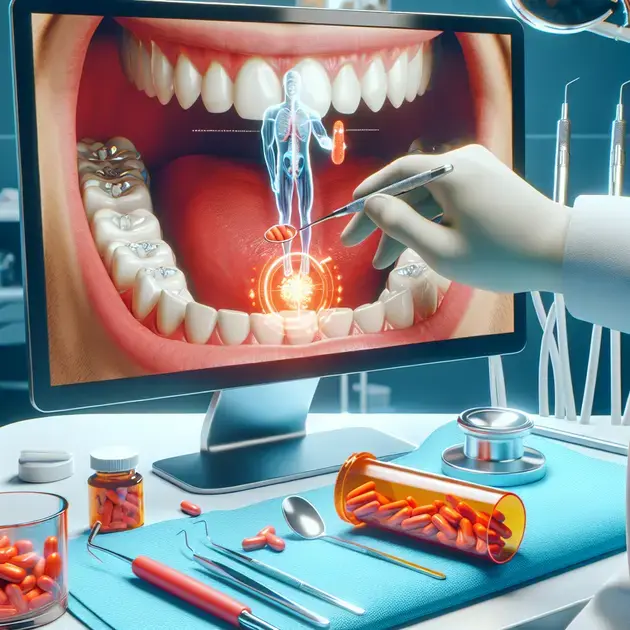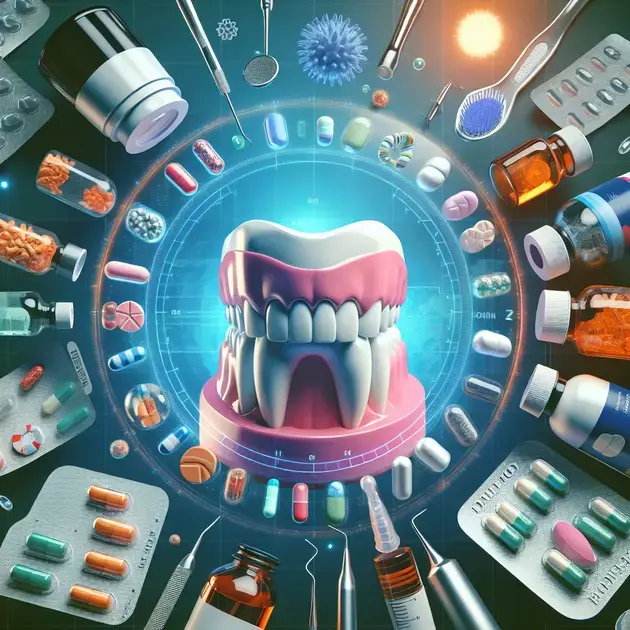Effective medication for treating periodontitis is essential for managing this common dental condition. Periodontitis is a serious gum infection that damages the soft tissue and destroys the bone supporting your teeth. If left untreated, it can lead to tooth loss and other health problems. Fortunately, there are various medications available that can effectively treat periodontitis and help restore oral health.
One of the key factors in choosing the right medication for periodontitis treatment is the severity of the condition. Your dentist will assess the extent of the gum disease and recommend the most appropriate medication to address your specific needs. From antibiotics to antimicrobial mouth rinses, there are several options for combating periodontitis and preventing further progression of the disease.

The Importance of Effective Medication for Periodontitis Treatment
Periodontitis is a serious gum infection that damages the soft tissue and destroys the bone that supports your teeth. It can lead to tooth loss if not treated effectively. One of the key aspects of treating periodontitis is medication. Effective medication can help reduce inflammation, control bacterial growth, and promote healing of the gums.
To ensure successful treatment of periodontitis, it is essential to follow the prescribed medication regimen provided by your dentist or periodontist. This may include antibiotics to combat the bacterial infection, antiseptic mouthwashes to reduce plaque buildup, and anti-inflammatory drugs to alleviate gum inflammation.
When choosing medication for periodontitis treatment, it is important to consult with a dental professional who can assess the severity of your condition and recommend the most suitable medications. The right medication can make a significant difference in controlling the progression of periodontitis and improving your overall oral health.
One recommended resource for finding information on effective medication for periodontitis treatment is the website of the American Academy of Periodontology (https://www.perio.org/). Their website provides valuable insights into the latest advancements in periodontal treatment and medication options available.
Choosing the Right Medication Based on Severity of Periodontitis
The severity of periodontitis can vary from mild (gingivitis) to severe (advanced periodontitis), and the choice of medication should be tailored to the specific needs of each individual case. Mild cases may only require a professional cleaning and improved oral hygiene habits, while more severe cases may necessitate surgical intervention and aggressive medication.
To determine the right medication for periodontitis based on severity, a comprehensive periodontal evaluation is essential. This evaluation will assess the extent of gum damage, bone loss, and other factors that influence the choice of medication. Your dentist or periodontist will then recommend a personalized treatment plan that may include antibiotics, antimicrobial agents, or other medications.
One useful tool for understanding the appropriate medication for different stages of periodontitis is the app “Dental Drugs – guide to prescription and OTC medications” available for download on the App Store and Google Play Store. This app provides detailed information on medications commonly used in periodontal treatment and their indications based on the severity of the condition.
Choosing the right medication based on the severity of periodontitis is critical for achieving successful treatment outcomes and preventing further progression of the disease. By following the guidance of your dental care provider and utilizing resources such as medication guides, you can effectively manage periodontitis and maintain good oral health.
Various Medications Available for Treating Periodontitis
There are various medications available for treating periodontitis, each with its unique mechanisms of action and benefits. Common medications used in the treatment of periodontitis include antibiotics, antiseptic mouth rinses, and anti-inflammatory drugs.
Antibiotics such as doxycycline and minocycline are often prescribed to combat the bacterial infection that causes periodontitis. These medications can be taken orally or applied directly to the gums to target the bacteria responsible for gum inflammation and tissue damage.
Antiseptic mouth rinses containing chlorhexidine or essential oils are commonly recommended to reduce plaque accumulation and prevent bacterial growth in the mouth. These rinses can help maintain a healthy oral environment and support the effectiveness of other periodontal treatments.
Anti-inflammatory drugs like ibuprofen or aspirin may be prescribed to alleviate gum inflammation and discomfort associated with periodontitis. These medications can help reduce swelling, pain, and redness in the gums, allowing for better healing and management of the condition.
For a comprehensive overview of the various medications available for treating periodontitis and their recommended uses, you can refer to the website of the National Institute of Dental and Craniofacial Research (https://www.nidcr.nih.gov/). Their online resources provide detailed information on dental health topics, including the latest advancements in periodontal medication.

Understanding the Effectiveness of Periodontitis Medication
Periodontitis medication plays a crucial role in managing and treating gum disease effectively. Research has shown that certain medications can help reduce inflammation, control bacterial growth, and promote healing of the gums. By understanding the effectiveness of these medications, patients can take proactive steps towards improving their oral health and preventing further complications.
One of the key medications used in the treatment of periodontitis is antibiotics. These medications are often prescribed to control bacterial infections in the gums and reduce harmful bacteria levels. Additionally, antimicrobial mouth rinses are commonly recommended to help eliminate bacteria in hard-to-reach areas of the mouth, further preventing the progression of gum disease.
In some cases, over-the-counter pain relievers may be prescribed to manage discomfort and pain associated with periodontitis. These medications can help improve the patient’s quality of life during treatment and promote adherence to the prescribed oral hygiene routine.
It is important for patients to follow their dentist’s recommendations regarding the use of periodontitis medication. Consistent and proper use of these medications, in conjunction with professional dental cleanings and good oral hygiene practices, can significantly improve the effectiveness of treatment and promote better long-term oral health outcomes.
Medication Management Strategies for Treating Periodontitis
Effective medication management is essential for successfully treating periodontitis and preventing its progression. Patients should work closely with their dental healthcare provider to develop a personalized treatment plan that includes the appropriate use of medications. This may involve taking antibiotics as prescribed, using antimicrobial mouth rinses regularly, and incorporating any pain relievers into their daily routine.
In addition to following the recommended medication regimen, patients should also adhere to a strict oral hygiene routine. This includes brushing and flossing regularly, using fluoridated toothpaste, and attending regular dental check-ups and cleanings. These practices can help control bacterial growth, reduce inflammation, and promote healing of the gums.
Furthermore, lifestyle factors such as diet and smoking can impact the effectiveness of periodontitis medication. Patients are advised to maintain a healthy diet rich in vitamins and minerals to support overall gum health. Quitting smoking is also highly recommended, as tobacco use can impair the body’s ability to heal and increase the risk of complications during treatment.
By implementing medication management strategies and maintaining good oral hygiene practices, patients can optimize the effectiveness of their periodontitis treatment and improve their chances of achieving healthy gums and teeth in the long run.
The Role of Medication in Enhancing Periodontitis Treatment
Medication plays a vital role in enhancing the effectiveness of periodontitis treatment by targeting the underlying causes of gum disease and promoting healing. Antibiotics, for example, are commonly prescribed to target specific strains of bacteria that contribute to inflammation and infection in the gums. By reducing bacterial levels, antibiotics help control the progression of periodontitis and support the body’s natural healing process.
Antimicrobial mouth rinses are another important medication used to enhance periodontitis treatment. These rinses contain active ingredients that help eliminate bacteria in hard-to-reach areas of the mouth, where traditional brushing and flossing may not be as effective. Regular use of antimicrobial rinses can complement daily oral hygiene practices and promote overall gum health.
Pain relievers may also be incorporated into the treatment plan to manage discomfort and pain associated with periodontitis. By alleviating symptoms, pain relievers can improve the patient’s quality of life and make it easier to adhere to the prescribed treatment regimen.
It is essential for patients to communicate openly with their dental healthcare provider about their medication needs and any concerns or side effects they may experience. By working together to develop a comprehensive treatment plan that includes the appropriate use of medications, patients can enhance the effectiveness of their periodontitis treatment and achieve better oral health outcomes.
**
Conclusion
**
In conclusion, understanding the effectiveness of periodontitis medication is paramount in managing gum disease and promoting oral health. Medications such as antibiotics, antimicrobial mouth rinses, and pain relievers play crucial roles in reducing inflammation, controlling bacterial growth, and supporting gum healing. By following dentists’ recommendations and incorporating these medications into a personalized treatment plan, patients can actively enhance the outcomes of their periodontitis treatment.
Effective medication management strategies, including proper use of prescribed medications and adherence to oral hygiene routines, are vital for preventing the progression of periodontitis. Patients should prioritize regular dental check-ups, brushing and flossing, and using fluoridated toothpaste. Lifestyle factors like diet and smoking also influence medication effectiveness, emphasizing the importance of maintaining a healthy lifestyle to support gum health and treatment outcomes.
Medication plays a significant role in enhancing periodontitis treatment by targeting underlying causes, managing symptoms, and promoting healing. Antibiotics and antimicrobial mouth rinses help eliminate bacteria and control infection, while pain relievers alleviate discomfort, improving patients’ quality of life. Open communication with dental healthcare providers ensures proper medication use and comprehensive treatment planning, ultimately leading to better oral health and successful periodontitis management.



